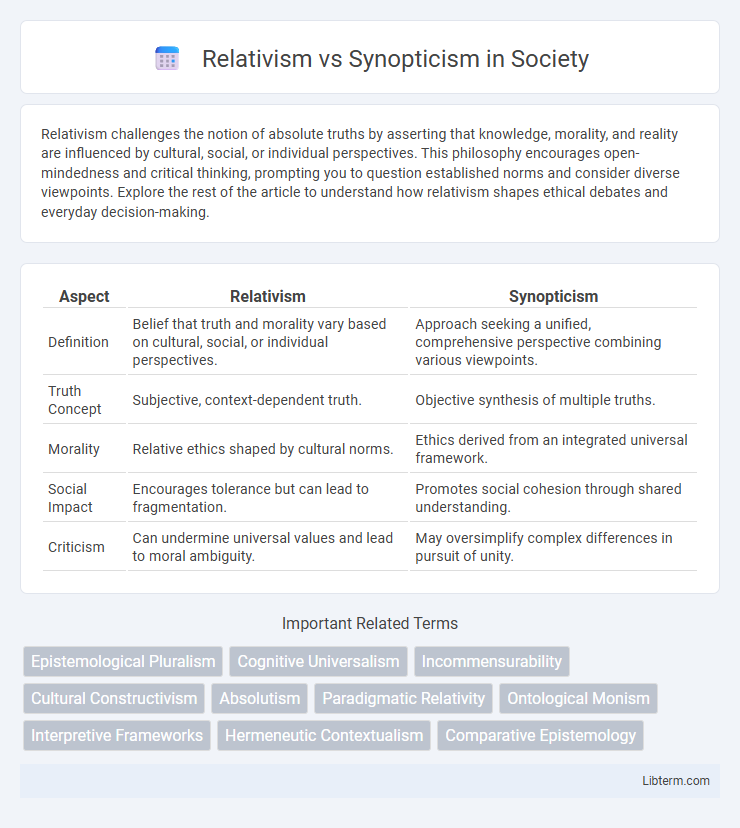Relativism challenges the notion of absolute truths by asserting that knowledge, morality, and reality are influenced by cultural, social, or individual perspectives. This philosophy encourages open-mindedness and critical thinking, prompting you to question established norms and consider diverse viewpoints. Explore the rest of the article to understand how relativism shapes ethical debates and everyday decision-making.
Table of Comparison
| Aspect | Relativism | Synopticism |
|---|---|---|
| Definition | Belief that truth and morality vary based on cultural, social, or individual perspectives. | Approach seeking a unified, comprehensive perspective combining various viewpoints. |
| Truth Concept | Subjective, context-dependent truth. | Objective synthesis of multiple truths. |
| Morality | Relative ethics shaped by cultural norms. | Ethics derived from an integrated universal framework. |
| Social Impact | Encourages tolerance but can lead to fragmentation. | Promotes social cohesion through shared understanding. |
| Criticism | Can undermine universal values and lead to moral ambiguity. | May oversimplify complex differences in pursuit of unity. |
Introduction to Relativism and Synopticism
Relativism asserts that truth and morality are not absolute but vary according to cultural, societal, or individual perspectives, emphasizing the context-dependent nature of knowledge. Synopticism, in contrast, advocates for a comprehensive and integrative viewpoint that unites diverse perspectives to form a cohesive understanding of complex concepts or truths. These approaches offer distinct frameworks for interpreting reality--relativism highlighting plurality and subjectivity, while synopticism focuses on synthesis and overarching coherence.
Defining Relativism: Core Concepts
Relativism centers on the principle that truth and moral values are not absolute but vary depending on cultural, social, or individual perspectives. This epistemological approach challenges universal standards by asserting that knowledge and ethics are context-dependent, shaped by historical and environmental influences. Key concepts include cultural relativism, which emphasizes understanding beliefs within their cultural frameworks, and moral relativism, which denies fixed ethical principles across different societies.
Synopticism Explained: An Overview
Synopticism refers to the approach of examining the Synoptic Gospels--Matthew, Mark, and Luke--by comparing their narratives side by side to identify commonalities and differences in content, structure, and theology. This method uncovers the interdependence and sources behind the texts, such as the hypothetical Q source and Markan priority, which are essential for biblical scholarship. Synopticism helps clarify the historical Jesus' life and teachings by synthesizing diverse gospel perspectives into a coherent framework.
Historical Development of Relativism
The historical development of relativism traces back to ancient Greek sophists, who argued that truth is subjective and varies with individual perception and culture. During the Enlightenment, philosophers like David Hume advanced epistemological skepticism, reinforcing the idea that knowledge is not absolute but contingent on human experience. In the 20th century, relativism became prominent in fields such as anthropology, ethics, and epistemology, challenging universal claims and emphasizing contextual understanding.
Origins and Evolution of Synopticism
Synopticism originated in the early 20th century as a critical approach to understanding the interrelations among the first three Gospels--Matthew, Mark, and Luke--highlighting their shared content and structure. This scholarly evolution stems from efforts to resolve the Synoptic Problem by analyzing textual similarities and differences to uncover the sources and traditions behind these canonical texts. Synopticism's growth reflects a move toward greater historical and literary analysis, contrasting with relativism's emphasis on subjective interpretation and cultural context in understanding religious texts.
Key Differences Between Relativism and Synopticism
Relativism asserts that truth and morality vary based on cultural, historical, or personal perspectives, emphasizing subjective interpretation without universal absolutes. Synopticism involves synthesizing multiple viewpoints or sources into a coherent whole, promoting comprehensive understanding through comparative analysis. The key difference lies in relativism's emphasis on variability and context-dependence, whereas synopticism prioritizes integrative overview and unified insight across diverse perspectives.
Philosophical Implications and Debates
Relativism challenges absolute truths by asserting that knowledge and morality are context-dependent, prompting debates on the validity of universal ethical standards. Synopticism emphasizes a holistic perspective that integrates diverse viewpoints to seek objective understanding, advocating for a synthesis beyond cultural or subjective limitations. The philosophical implications center on the tension between subjective pluralism in relativism and the pursuit of comprehensive coherence in synopticism, fueling ongoing discussions about the nature of truth and epistemic justification.
Relativism and Synopticism in Modern Thought
Relativism in modern thought emphasizes the variability of truth and morality across different cultures and perspectives, challenging the notion of absolute or universal truths. Synopticism promotes an integrative approach, seeking to synthesize diverse viewpoints and frameworks to form a cohesive understanding of complex issues. Contemporary debates often contrast relativism's pluralistic tolerance with synopticism's pursuit of holistic coherence in philosophy, ethics, and epistemology.
Real-World Applications and Case Studies
Relativism in ethics emphasizes cultural or individual perspectives, as seen in multicultural corporate policies that adapt to diverse employee values, while Synopticism applies holistic frameworks integrating multiple viewpoints, evident in environmental sustainability projects balancing economic, social, and ecological factors. Case studies in international business demonstrate relativism when companies tailor marketing strategies to local customs, contrasting with synoptic approaches that unify global branding with regional adaptations. Real-world applications of synopticism also appear in public health, combining medical, social, and economic data to optimize community interventions.
Conclusion: Navigating Between Perspectives
Relativism emphasizes the subjective interpretation of facts, suggesting that truth varies based on individual or cultural perspectives, whereas Synopticism seeks a comprehensive understanding by integrating multiple viewpoints into a coherent whole. Navigating between these perspectives requires balancing open-mindedness with critical analysis to discern context-specific truths without losing sight of universal principles. Effective decision-making involves recognizing the strengths of relativist flexibility while leveraging synoptic synthesis to achieve clarity and consensus.
Relativism Infographic

 libterm.com
libterm.com